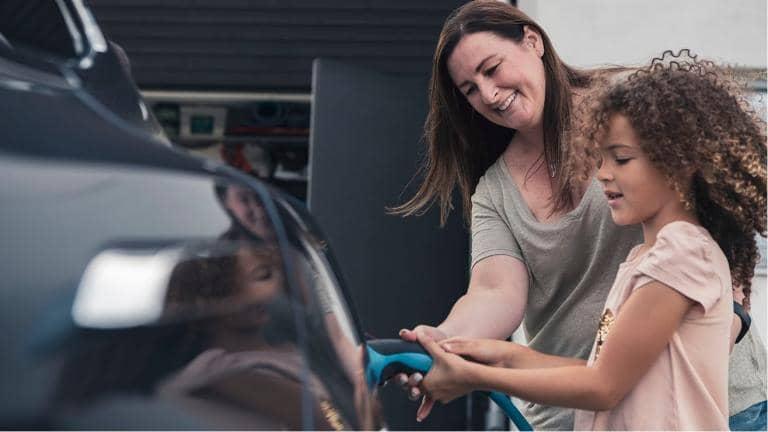
Is it time to switch to an electric car?
Get ready to embrace electric cars
Keen to find out more about electric cars? Here’s the Energy Saving Trust’s guide to going electric.

Why active travel could be the way to go
5 min read
What you’ll discover:
Hear from the experts at Energy Saving Trust on how active travel could benefit you. If you’re trying to live more sustainably, stay active and potentially save money, it’s worth thinking about adding more ‘active travel’ to your daily life. This means travelling in physically active ways, whether that’s by walking, cycling or wheeling (if you use a wheelchair).
Replacing car journeys with active travel can help to reduce your carbon footprint because it doesn’t need any fossil fuels to power your journey, unless you need to charge your e-bike or electric wheelchair. It could also help you to de-stress, make more friends and support your local community – all great reasons to think about leaving the car at home.
Health, happiness and helping the planet – why active travel could be a way forward
1. You could save money
Cars can be expensive to buy, maintain and run. When you’re filling up with fuel for lots of short journeys, the costs could add up unexpectedly. Comfortable trainers or a basic cycle might not cost much by comparison. According to Energy Saving Trust, reducing your car use by a quarter and replacing it with active travel could help you save up to £250 in fuel costs per year1.
2. You could get healthier and feel better
Regular walking, wheeling or cycling could help reduce your risk of certain health conditions, such as cardiovascular disease, by 35%2. It can also support healthy weight management and help you manage stress. Additionally, getting some fresh air, seeing the seasons change and enjoying the local community with other people could give you a wellbeing boost.
3. You could reduce your carbon footprint
Switching away from fossil-fuelled travel could cut carbon dioxide (CO2) emissions and air pollution, which can be a danger to public health and ecosystems. Choosing active travel means you're helping to promote cleaner air and quieter spaces for your community.
4. You could get to your destination faster than you think
Yes, driving can be speedier than walking, wheeling or cycling. However, when you factor in congestion, finding a parking spot and getting to exactly where you need to be, it may not really be that much quicker for local and urban journeys. On average, you can walk a mile in 15-20 minutes or cycle this distance in around five minutes3. It could take longer to find your car keys!
It could also be worth considering an electric bike (also known as an e-bike) - they could help you get to your destination even quicker and could be cheaper than buying a car.
Why it could benefit you to get more walking or wheeling into your weekly routine
Walking and wheeling are two great ways to reduce your carbon footprint. Replacing a weekly 3-mile return car journey with walking or wheeling could save £30 and 45kg carbon dioxide emissions in a year, according to Energy Saving Trust4.
Here are more tips to help you take your first steps:
It’s time to celebrate cycling
With plenty of off-road routes across the UK, there could be no limit to how far your wheels can take you.
There are lots of benefits to getting around by cycling. According to Energy Saving Trust, cycling can help improve your heart and lung capacity. Aside from health benefits, you could get around your town or city faster than driving. With the UK government investing large sums of money to improve cycling and walking routes5, cycling is only set to get better.
Here are some tips and resources to help you start cycling:
Could an e-bike be good for you?
If you don’t think cycling is for you, you could consider an e-bike. With an electric motor and battery, they can help you ride further, faster and get up hills. They could be helpful for anyone who finds cycling on a standard bike challenging. There are many options to choose from, including electric adapted cycles and e-cargo bikes. These bikes emit 82 times less CO2 per mile6 than the average petrol or diesel car.
Visit the Energy Saving Trust website to learn more about riding an e-bike, electric adapted cycle or e-cargo bike and their potential benefits, maintenance costs and more.
Every mile makes a difference – here’s why they count
Some trips just aren’t possible with active travel. However, by combining active travel with public transport, you could use active travel for longer journeys.
Here’s how it all adds up, according to Energy Saving Trust:
All information is based on the most up-to-date research from Energy Saving Trust as of February 2024. Changes in the price of electricity, petrol and diesel since this date might affect the estimated savings. This article isn’t advice and is for general guidance only. Always do your own research before taking any action. We’re not responsible for the content of the websites mentioned in this article.
Get ready to embrace electric cars
Keen to find out more about electric cars? Here’s the Energy Saving Trust’s guide to going electric.
If you’re on the road and need to recharge your electric vehicle (EV), there’s a growing network of public chargers in the UK that you could use.
To help you plan for smoother journeys, here’s a guide with expert help from Energy Saving Trust.
